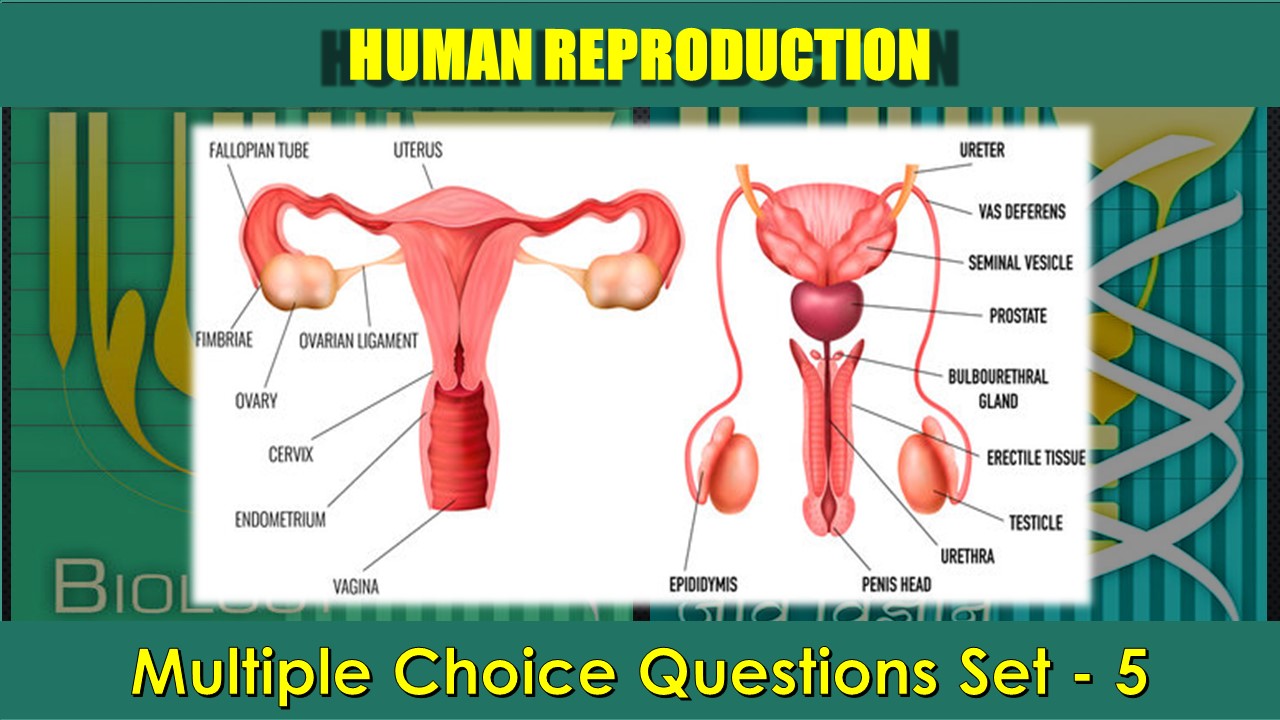CBSE Class 12 Human Reproduction Multiple Choice Questions with Answers. MCQ Questions Class 12 Human Reproduction with Answers Is Prepared Based on Latest Exam Pattern. Students can solve NCERT MCQ questions Class 12 Human Reproduction with Answers to know their preparation level.
Students who are searching for NCERT MCQ Questions Class 12 Human Reproduction with Answers are compiled here to get good practice on all fundamentals. Know your preparation level on MCQ Questions for Class 12 Human Reproduction with Answers. You can also verify your answers from the provided MCQ Class 12 Human Reproduction with Answers. So, ace up your preparation with MCQ of Class 12 Biology Examinations.
MCQ Questions Class 12 Human Reproduction with Answers - Set - 5
Question 1:
The extra embryonic membranes of the mammalian embryo are derived from
(a) trophoblast
(b) inner cell mass
(c) formative cells
(d) follicle cells
Correct Answer – (A)
Question 2:
The membranous cover of the ovum at ovulation is
(a) corona radiate
(b) zona radiata
(c) zona pellucida
(d) chorion.
Correct Answer – (A)
Question 3:
In human females, meiosis-II is not completed until
(a) uterine implantation
(b) birth
(c) puberty
(d) fertilisation
Correct Answer – (D)
Question 4:
Ovulation in the human female normally takes place during the menstrual cycle
(a) at the mind secretory phase
(b) just before the end of the secretory phase
(c) at the beginning of the proliferative phase
(d) at the end of the proliferative phase
Correct Answer – (D)
Question 5:
The difference between spermiogenesis and spermiation is
(a) in spermiogenesis spermatids are formed, while in spermiation spermatozoa are formed
(b) in spermiogenesis spermatozoa are formed, while in spermiation spermatids are formed
(c) in spermiogenesis spermatozoa from Sertoli cells are released into the cavity of seminiferous tubules, while in spermiation spermatozoa are formed
(d) in spermiogenesis spermatozoa are formed, while in spermiation spermatozoa are released from Sertoli cells into the cavity of seminiferous tubules
Correct Answer – (D)
MCQ Questions Class 12 Human Reproduction With Answers
Question 6:
In humans, at the end of the first meiotic division,the male germ cells differentiate into the
(a) spermatids
(b) spermatogonia
(c) primary spermatocytes
(d) secondary spermatocytes.
Correct Answer – (D)
Question 7:
Which one of the following statements is false in respect of viability of mammalian sperm?
(a) Sperm is viable for only up to 24 hours.
(b) Survival of sperm depends on the pH of the medium and is more active in alkaline medium.
(c) Viability of sperm is determined by its motility.
(d) Sperms must be concentrated in a thick suspension
Correct Answer – (A)
Question 8:
Egg is liberated from ovary in
(a) secondary oocyte stage
(b) primary oocyte stage
(c) oogonial stage
(d) mature ovum stage.
Correct Answer – (A)
Question 9:
Hormones secreted by the placenta to maintain pregnancy are
(a) hCG, hPL, progestogens, prolactin
(b) hCG, hPL, estrogens, relaxin, oxytocin
(c) hCG, hPL, progestogens, estrogens
(d) hCG, progestogens, estrogens, glucocorticoids.
Correct Answer – (C)
Question 10:
All of the following statements concerning pregnancy are accurate EXCEPT
(a) the detection of human chorionic gonadotropin in the urine forms the basis for pregnancy tests.
(b) the cyclic release of pituitary gonadotropins and ovarian steroids is continued.
(c) the mammary gland tissue of the pregnant woman is stimulated to develop by placental hormones.
(d) the corpus luteum of pregnancy maintains the uterus until the placenta is well established.
Correct Answer – (B)
- NCERT Solutions Class 11 Chemistry Chapter 1 : Some Basic Concepts of Chemistry
- NCERT Solutions Class 11 Chemistry Chapter 2 : Structure Of The Atom
- NCERT Solutions Class 11 Chemistry Chapter 3 : Classification of Elements and Periodicity in Properties
- NCERT Solutions Class 11 Chemistry Chapter 4 : Chemical Bonding and Molecular Structure
- NCERT Solutions Class 11 Chemistry Chapter 5 : States of Matter
- NCERT Solutions Class 11 Chemistry Chapter 6 : Thermodynamics
- NCERT Solutions Class 11 Chemistry Chapter 7 : Equilibrium
- NCERT Solutions Class 11 Chemistry Chapter 8 : Redox Reactions
- NCERT Solutions Class 11 Chemistry Chapter 9 : Hydrogen
- NCERT Solutions Class 11 Chemistry Chapter 10 : The s-Block Elements
- NCERT Solutions Class 11 Chemistry Chapter 11 : The p-Block Elements
- NCERT Solutions Class 11 Chemistry Chapter 12 : Organic Chemistry: Some Basic Principles and Techniques
- NCERT Solutions Class 11 Chemistry Chapter 13 : Hydrocarbons
- NCERT Solutions Class 11 Chemistry Chapter 14 : Environmental Chemistry




